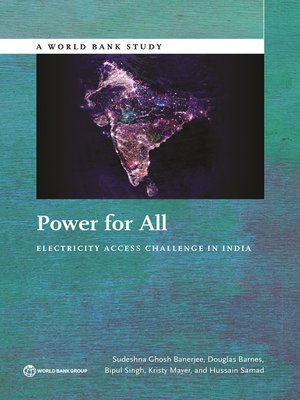Power for All
ebook ∣ Electricity Access Challenge in India · World Bank Studies
By Sudeshna Ghosh Banerjee

Sign up to save your library
With an OverDrive account, you can save your favorite libraries for at-a-glance information about availability. Find out more about OverDrive accounts.
Find this title in Libby, the library reading app by OverDrive.



Search for a digital library with this title
Title found at these libraries:
| Loading... |
India is a leading developing country in providing electricity to rural and urban populations. By late 2012, the national electricity grid had reached 92 percent of India's rural villages, or about 880 million people. Yet, approximately 311 million people-mostly those in rural areas-still live without electricity. Less than half of all households in the poorest income group have electricity. Even among households with electricity, hundreds of millions lack reliable supply and experience power cuts almost daily. Achieving universal access to electricity by 2030 is not fi nancially prohibitive for India. The challenge of providing electricity for all is achievable, ensuring that India joins such countries as China and Brazil in reaching out to even its remotest populations. Policies will need to be aligned with the principles followed in other successful international programs. The potential benefi ts of electrifi cation for those without service are quite high. The benefi ts of lighting alone would approximately equal the investments necessary to extend electricity for all. Households with electricity consume more than 100 times as much light as do households with kerosene for about the same amount of money. Without quality energy services, households often face entrenched poverty, poor delivery of social services, and limited opportunities for women and girls. This book will be of interest to a wide audience, including policy makers, experts and managers in the international development community, and those in academia.






